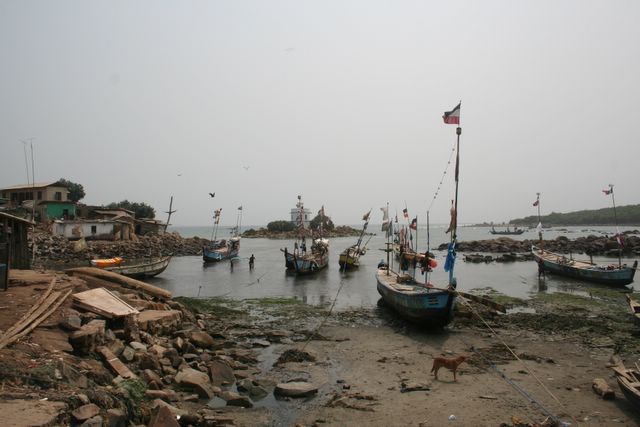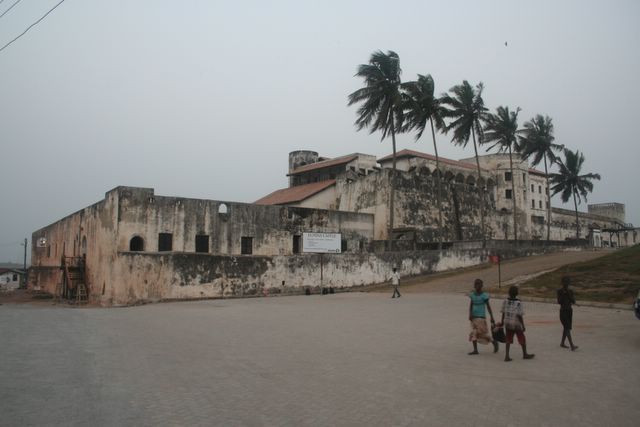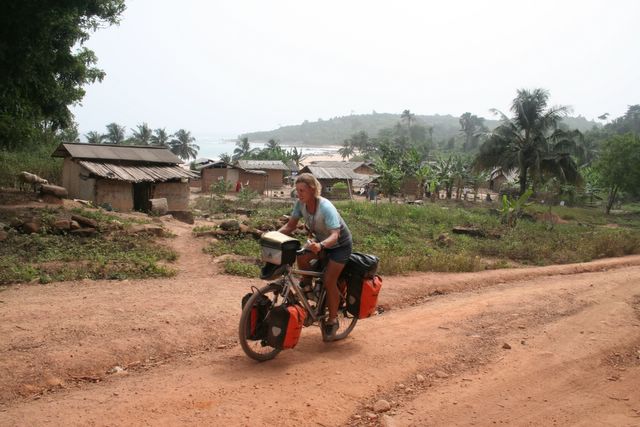update 10.
rediscovering the pleasures of cycling
30 January, 2007
Burkina Faso and Ghana
Total kilometers cycled: 16,459
Specific country info on routes & roads/food & accommodation/the locals available here.
We are always amazed at how kind people are to cyclists! Here are some of the nicest things people have done for us since we've been on the road.
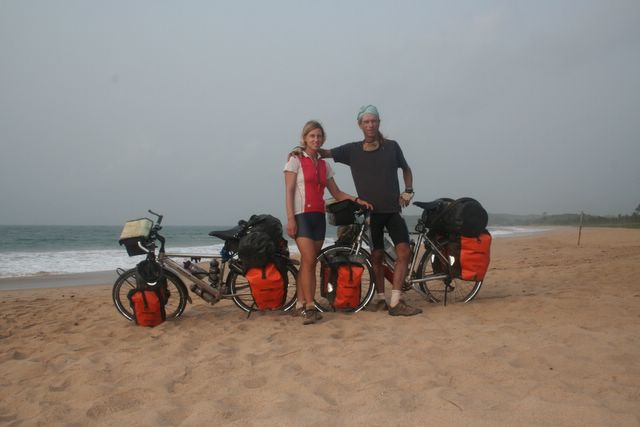 One incredibly hot afternoon in Senegal, a French motorist pulled over to where we were resting by
the side of the road and offered us an
ice-cold coke--really hit the spot !
One incredibly hot afternoon in Senegal, a French motorist pulled over to where we were resting by
the side of the road and offered us an
ice-cold coke--really hit the spot !
- When we turned up in a remote part of northern Sierra Leone and asked the village chief if we could pitch our tent nearby, he responded by opening up a local diplomat's home (he was on assignment abroad) for us to spend the night.
- A kind woman in The Gambia woke up very early one Sunday morning to fry up apple fritters and fish pies for us to take along for a picnic lunch.
- We must often look lost because we've been given maps four times so far on the trip. A big help as decent maps are hard to get your hands on in Africa.
- Finding food on the road is always a challenge, and one afternoon in a small town in Guinea Bissau we were having particularly bad luck. Finally, a passing motorist came to our rescue and led us to a terrace where we were served a delicious vegetarian lunch on fine china. Turns out this wasn't a restaurant at all, just a generous family who had taken pity on two itinerant cyclists.
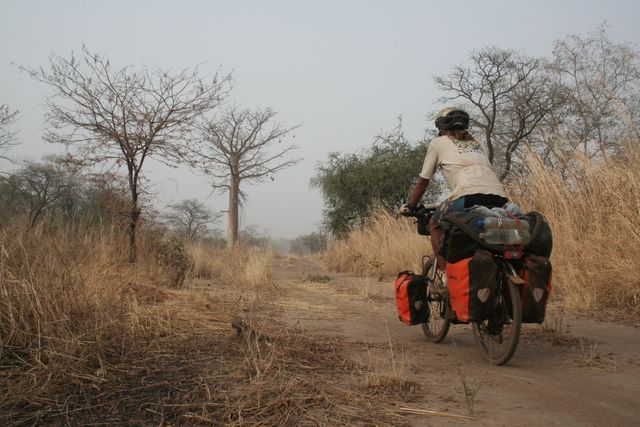 The
thorn
trees eventually tapered off, the dusty and desolate dirt roads
gave way to modern highways cutting through the dense tropical forest,
and we're finding evenings spent chatting
around a bonfire at the beach ever so much more enjoyable than
those spent repairing punctures. Yes, life has gotten better for
your road-weary cyclists--we just might make it to Cape Town after all.
The
thorn
trees eventually tapered off, the dusty and desolate dirt roads
gave way to modern highways cutting through the dense tropical forest,
and we're finding evenings spent chatting
around a bonfire at the beach ever so much more enjoyable than
those spent repairing punctures. Yes, life has gotten better for
your road-weary cyclists--we just might make it to Cape Town after all.
Not that the cycling has been a bed of roses since we left Niamey, where we last updated you. All was going (reasonably) well until we met up with a fellow cyclist traveling in the opposite direction, who suggested we alter our route to take in the Arly National Park in Burkina Faso. This meant 'extra' kilometers, and we
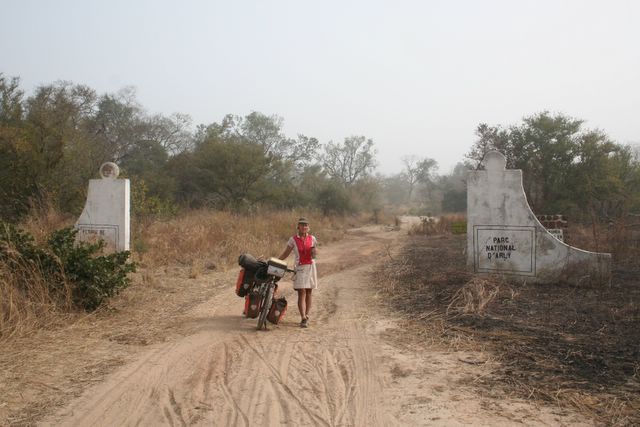 were leery of
giving up smooth tarmac for the unknowns of a secondary road.
Now, we trusted our new bicycling buddy when he assured us that
the road was in good condition and sand-free. What a mistake! We
were in for three days of bone-jarring corrugations, potholes of
unfathomable depths and the
usual sandy pitfalls. All that pushing was good for buffing up
the biceps, but constituted a big blow to morale.
were leery of
giving up smooth tarmac for the unknowns of a secondary road.
Now, we trusted our new bicycling buddy when he assured us that
the road was in good condition and sand-free. What a mistake! We
were in for three days of bone-jarring corrugations, potholes of
unfathomable depths and the
usual sandy pitfalls. All that pushing was good for buffing up
the biceps, but constituted a big blow to morale. After ringing in the new year over beans and beer in the roadside town of Pama, we took to the tarmac again and pushed on to Burkina Faso's capital, Ouagadougou. Time to pick up visas again, stock up on toilet paper and toothpaste and take in a locally made movie--Ouaga being home to a highly-acclaimed film industry. This was also one of our last chances to enjoy the crusty baguettes of the francophone countries--we were heading towards English-speaking Ghana and were in for the soggy and sweet variety of bread bequeathed by the British. Even worse,it turns out, than the bread Amaya was subjected to as a child growing up in Montana.
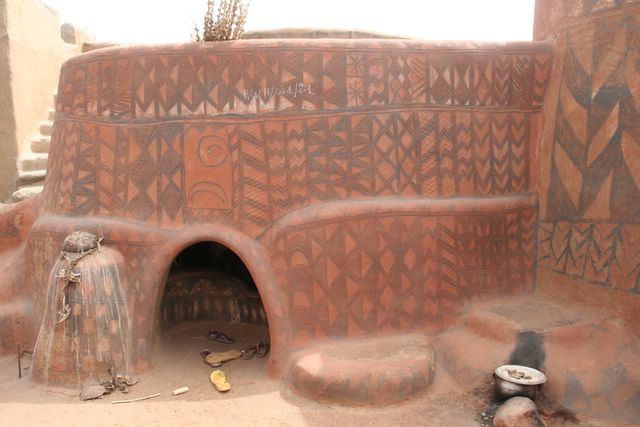 Our last stop in Burkina was the capital of Gourounsi
country,Tiébélé, where, for a small
fee, one of the chief's younger brothers gave us a tour
of the rather pretentiously named 'Royal Court'. A literal labyrinth of intricately
painted dwellings where one had to duck low to enter the circular mud
huts. This was a security measure, we were told, to keep out
foreign invaders during the tribal wars of former times. We
declined the offer of rooftop camping in the compound (again for a small
fee) and in spite of the midday heat, headed on to the Ghanaian border.
Our last stop in Burkina was the capital of Gourounsi
country,Tiébélé, where, for a small
fee, one of the chief's younger brothers gave us a tour
of the rather pretentiously named 'Royal Court'. A literal labyrinth of intricately
painted dwellings where one had to duck low to enter the circular mud
huts. This was a security measure, we were told, to keep out
foreign invaders during the tribal wars of former times. We
declined the offer of rooftop camping in the compound (again for a small
fee) and in spite of the midday heat, headed on to the Ghanaian border. There was another traveler snoozing outside the border post when we pulled up on our bikes. Having roused him from his rest, he explained--and we detected a note of exasperation in his voice- that the official entrusted with the stamps had 'gone out'. By the time the stamp man
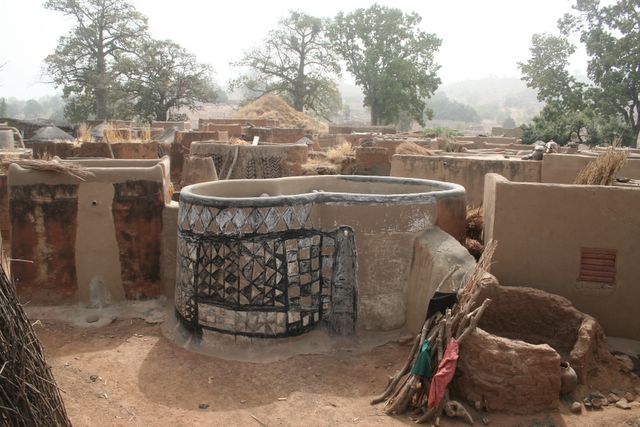 had returened, we'd gotten to know Graham and
accepted his invitation to spend the night in nearby Bongo, where he
was teaching in a local secondary school. After a delicious
dinner of veg curry and rice, we walked over to the adjoining hostel
to meet some of the boarding students.
had returened, we'd gotten to know Graham and
accepted his invitation to spend the night in nearby Bongo, where he
was teaching in a local secondary school. After a delicious
dinner of veg curry and rice, we walked over to the adjoining hostel
to meet some of the boarding students. Despite the absence of adult supervision, the teenagers we met demonstrated remarkable maturity and discipline. In the girls dormitory, young ladies were busy sweeping the courtyard, cooking stew for the coming week and revising their lessons. And this was still the Christmas break! Conditions were cramped with more than 40 bunks crowded together with just enough room to squeeze by. No one was complaining though, because the girls had it quite good compared with the boys. They had no bunks at all, and slept on thin mats (which made our therma-rest knock-offs look downright luxurious). There was no toilet either for the boys, and those who want a little privacy get up before dawn to head for the 'bush toilet' to take care of their needs in the cover of darkness. The young men appeared to be just as studious as the girls, and we found most of them in an empty classroom poring over their books. We were impressed! Unfortunately, there are still many children who don't have the opportunity to attend school. If you'd like to support education for girls in Africa, please consider contributing to Camfed. More details here.
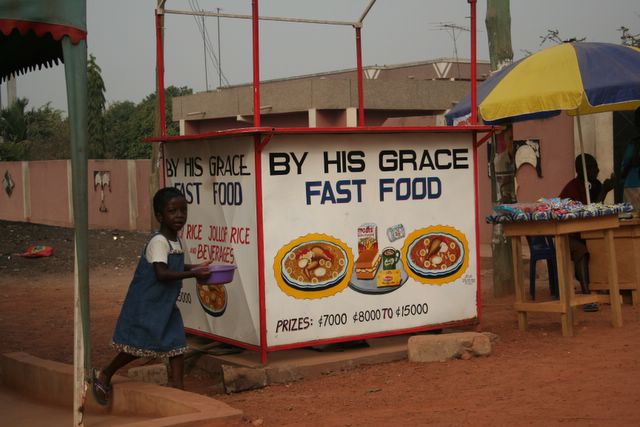 In the West, sex sells, but in Ghana it's God that brings in the
business. Signboards everywhere make reference to religion:
Christian prices, Baptist builders of blocks, In God we Trust Grocers. Oddly
enough, alcohol also looms large in Ghanaian society. 'Drinking
spots' are found almost as often as the prevalent places of worship,
and sometimes the two are even combined--as in the case of the Catholic
Mission Guesthouse in Tamale. It wasn't crucifixes and paintings
of the Virgin Mary that adorned the courtyard, rather posters
advertising Star Beer (for the foreign tourists who like the local
brew) and Guinness (for the locals who prefer their beer from
abroad).The
country is also home to money launderers. No, not the kind that
make
In the West, sex sells, but in Ghana it's God that brings in the
business. Signboards everywhere make reference to religion:
Christian prices, Baptist builders of blocks, In God we Trust Grocers. Oddly
enough, alcohol also looms large in Ghanaian society. 'Drinking
spots' are found almost as often as the prevalent places of worship,
and sometimes the two are even combined--as in the case of the Catholic
Mission Guesthouse in Tamale. It wasn't crucifixes and paintings
of the Virgin Mary that adorned the courtyard, rather posters
advertising Star Beer (for the foreign tourists who like the local
brew) and Guinness (for the locals who prefer their beer from
abroad).The
country is also home to money launderers. No, not the kind that
make 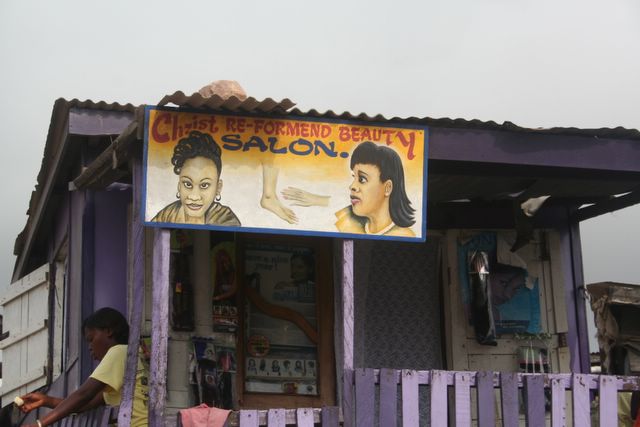 ilegitimate money appear legitimate, we're talking about people
who wash money--literally.
ilegitimate money appear legitimate, we're talking about people
who wash money--literally. On the food front, Ghana's got bush meat for those who are daring. The busy roads are lined with men proudly displaying freshly-caught grasscutter. Prices seemed quite reasonable, but we decided to go for the juicy pineapples instead.
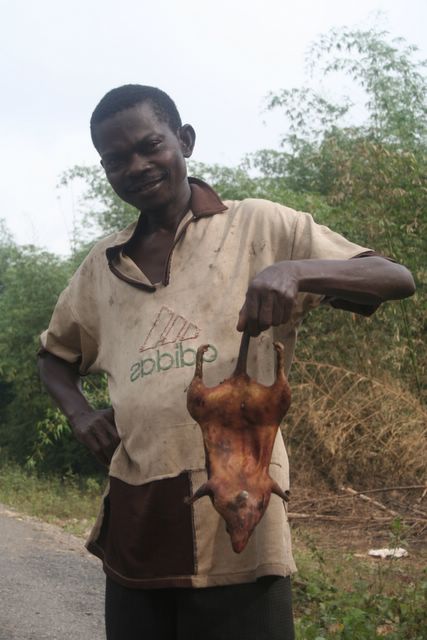
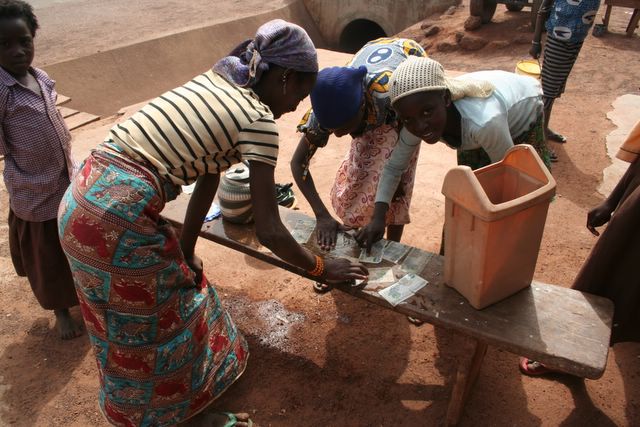
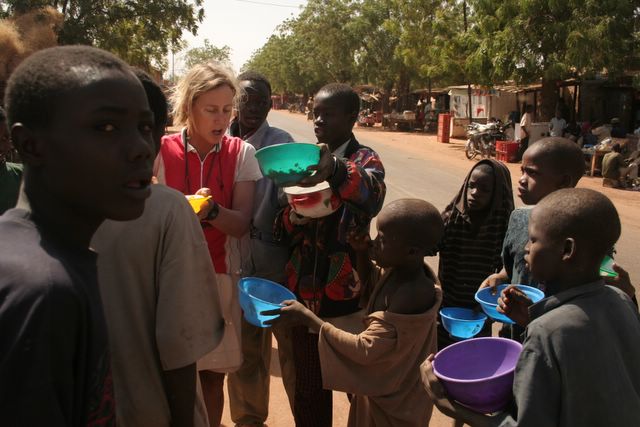 One thing you don't see much of in Ghana is beggars. And with
good reason: the country is one of the best-educated and
most
prosperous and politically stable in the region. In neighboring
countries (Mail in particular), the situation is truly troubling. Bands
of boys, some as young as five or six from the looks of them, loiter at
the roadside foodstalls waiting to gobble up what the customers leave
behind. It's a sad sight to see these youngsters, usually
shoeless and dressed in tatters, shivering in the chilly sahelian
mornings waiting for a few bread crusts or perhaps a handful of beans.
Hard to understand,too, why more isn't being done to end this
suffering.
One thing you don't see much of in Ghana is beggars. And with
good reason: the country is one of the best-educated and
most
prosperous and politically stable in the region. In neighboring
countries (Mail in particular), the situation is truly troubling. Bands
of boys, some as young as five or six from the looks of them, loiter at
the roadside foodstalls waiting to gobble up what the customers leave
behind. It's a sad sight to see these youngsters, usually
shoeless and dressed in tatters, shivering in the chilly sahelian
mornings waiting for a few bread crusts or perhaps a handful of beans.
Hard to understand,too, why more isn't being done to end this
suffering.We've been doing lots of touristy things since we arrived in Ghana. First a visit to Mole National Park and an early morning walk in the savanna to observe the elephants, warthogs and crocodiles in their natural habitat. After conquering some unbelievably steep hills, we enjoyed time camping and chilling out on the shores of Lake Bosumtwi. Then on to the coast and a couple of relaxing days on the almost deserted beach at the Green Turtle Lodge. The canopy walk at Kakum National Park gave us a different view of the rainforest and left Amaya's head swimming (she'll remember not to look down next time!) And finally, visits to some of the coastal forts built by the Europeans gave us a dose of culture.
Soon the sweltering heat of the tropics will give way to cooler temperatures, as we cycle on to Togo and the picturesque plateau region. Who knows what they call white people on the other side of the border, but we hope it's not obroni. We can hardly go anywhere in Ghana without hearing shrieks of Obroni, Obroni--where are you going? or Obroni, stop, stop! I wanna talk to you. or even Obroni, tell me your name--who are you?. Tiresome as you can imagine, and simply ignoring all the attention gets us nowhere, as the children (and a fair number of aduts as well) only become more insistent. Haven't they got anything better to do with their time than worry about what two white people are up to? Ahh, the joys of instant popularity!
